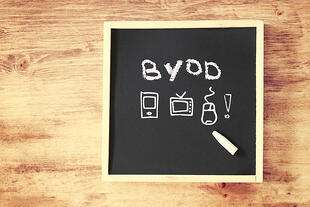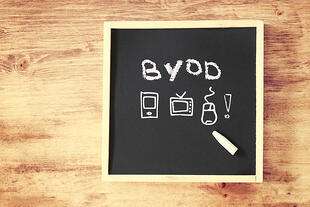Recent studies indicate that millennials will replace a large segment of the current workforce in about two years. In order to lure the new generation of workers, CIOs need to embrace the latest technology advancements along with specific IT trends, such as the BYOD phenomenon.

Standing for “bring your own device,” BYOD has become quite a common scenario where more and more employees use their own laptops, tablets, or Smartphones to do their jobs while at work, at home, or on the go. This new trend is expected to irreversibly impact various sectors, creating a domino effect among organizations in all industries.
How Will BYOD Affect the Future of ERP?
According to IT experts, advancements in BYOD will soon affect the everyday operations of IT departments, including those operating within the ERP sector. IT developers and service providers will need to shift further toward the cloud in order to offer more support for different mobile devices and apps. Since most IT companies do not have the necessary technology infrastructure, making the shift from on-premise systems to cloud alternatives can be problematic.
With more ERP systems and apps migrating to the cloud, corporate IT departments will become less present as hardware players. However, they will play a decisive role as advisors to companies, helping them select the right software solutions for specific needs, and to employees seeking guidance on making appropriate BYOD choices according to their work roles.
As the number of personal devices will continue to invade the workplace, IT departments’ responsibilities for Wi-Fi network capacity expansion and end-point security will also increase. Though BYOD is not a new concept, finding a way to seamlessly integrate multiple mobile devices with different ERP software solutions and apps remains one of the biggest challenges for IT professionals.
The aforementioned aspects indicate significant disadvantages resulting from BYOD implementations. However, you can make the most of a BYOD program by re-mapping your business strategy and creating a secure corporate network limited to appropriate staff members in order to protect your intellectual property.
In addition, you could opt for an effective ERP solution, which will better support your BYOD strategy. Considering that such a system along with the right BYOD program will improve millennials’ productivity along with overall job satisfaction, doing everything you can to implement a cutting-edge ERP solution into your organization is more important than you think.
Essential Things to Consider
Recently, the ERP market has been greatly affected by “mobility.” As a result, more millennials embrace the BYOD movement, requiring ERP developers to create new apps that integrate with all the phones and tablets available out there. Thus, mobility requirements should be part of discussions when defining the new functional framework for your organization.
Another essential aspect is that employees access business processes differently, based on their specific roles. For example, while the workers on the shop floor in a manufacturing facility might encounter difficulties when trying to use a laptop with a keyboard and a mouse to record information, the same workers may be able to use their own Smartphones or tablets with touch-screen displays to perform the same task. Based on this example, you have to ensure that the technology you choose facilitates BYOD integration, allowing your employees to complete assigned tasks easier than before.
One thing we must admit is that the adoption of the BYOD phenomenon can cause ERP policies and processes to fall short. Is this a bad thing? Not necessarily. In fact, not having the right tools to complete certain operations will drive app development, positively impacting the future of ERP. This means that ERP software developers will create new apps, which will allow millennials to customize ERP systems according to their work roles.
A large number of companies are currently adopting the BYOD trend, which means that the use of individual devices in the workplace is set to grow. Consequently, organizations must take the next step and find new ways to integrate mobile devices with existing ERP systems and networks. This will allow organizations not only to move from complex, expensive, and slow operations to more streamlined, cost-effective, scalable processes, but also to attract millennials and gain an edge over their competitors.
 The Future of ERP: Millennials And The BYOD Phenomenon">
The Future of ERP: Millennials And The BYOD Phenomenon">